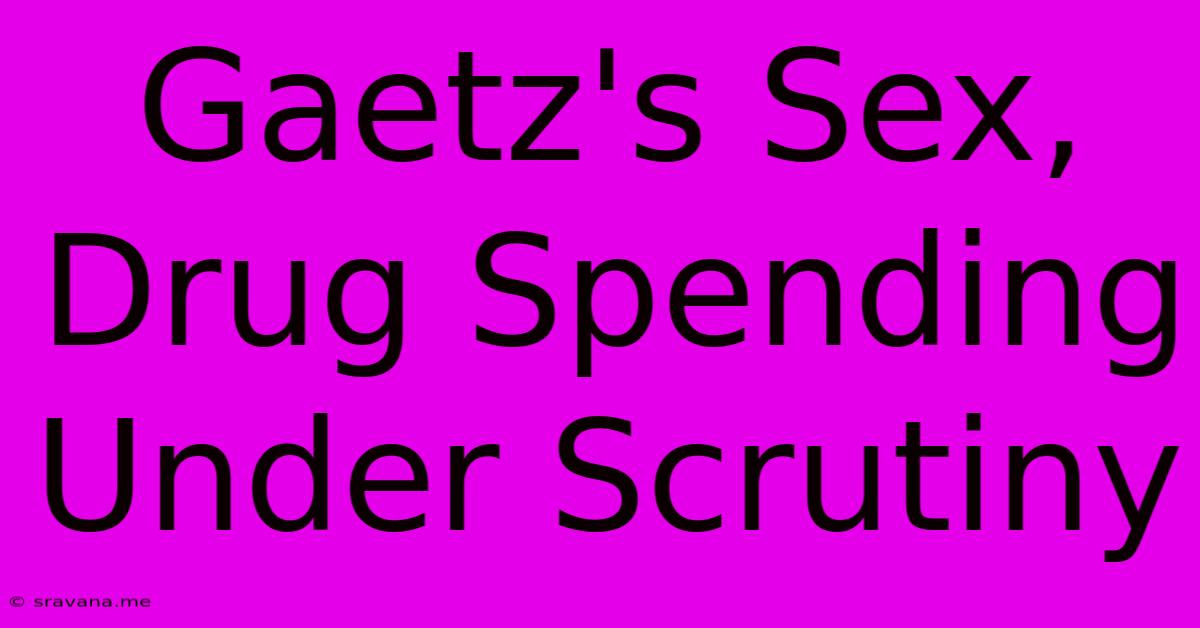Gaetz's Sex, Drug Spending Under Scrutiny

Discover more detailed and exciting information on our website. Click the link below to start your adventure: Visit Best Website sravana.me. Don't miss out!
Table of Contents
Gaetz's Sex, Drug Spending Under Scrutiny: A Deep Dive into the Allegations
Representative Matt Gaetz, a prominent figure in the Republican party, has found himself embroiled in a series of controversies involving allegations of sex trafficking and illicit drug use. These accusations, which have been under intense scrutiny for several years, raise serious questions about his conduct and fitness for public office. This article delves into the details of the allegations, examines the ongoing investigations, and explores the broader implications of this scandal.
The Nature of the Allegations
The accusations against Gaetz stem from a Department of Justice investigation into Joel Greenberg, a former Seminole County tax collector who pleaded guilty to multiple felonies, including sex trafficking of a minor. Greenberg's cooperation with federal authorities led to the scrutiny of Gaetz's activities, with allegations surfacing that he engaged in a pattern of illicit behavior involving underage girls and the use of drugs.
These allegations include claims that Gaetz paid for sex with a 17-year-old girl and used campaign funds to finance his lavish lifestyle, including drugs and encounters with escorts. The gravity of these claims is amplified by the potential violation of federal sex trafficking laws, which carry severe penalties.
While Gaetz has vehemently denied all allegations, the sheer volume of accusations and the involvement of a cooperating witness have kept the pressure on him. The lack of concrete evidence publicly available has, however, complicated the investigation and allowed Gaetz to maintain his position in Congress.
The Investigation and its Challenges
The investigation into Gaetz presents several significant challenges. Firstly, the nature of the allegations – involving private encounters and often relying on the testimony of individuals with their own legal vulnerabilities – makes building a strong case difficult. Secondly, the high-profile nature of the subject and the intense political polarization surrounding the issue create a charged atmosphere that complicates the investigative process.
The Justice Department faces the task of carefully corroborating witness testimonies and securing sufficient evidence to meet the high burden of proof required for a criminal conviction. This includes navigating complex legal questions regarding the statute of limitations and the admissibility of certain evidence.
Furthermore, the investigation has been subjected to intense media scrutiny, leading to a barrage of speculation and conflicting narratives. This media frenzy makes it harder for the investigators to conduct their work impartially and prevents a fair and objective assessment of the evidence until all information has been reviewed.
Political Ramifications and Public Opinion
The allegations against Gaetz have created significant ripples within the Republican party. While some Republicans have distanced themselves from him, others have rallied to his defense, highlighting the partisan divisions surrounding the case. This situation underlines the challenges of navigating complex moral issues within a highly politicized environment.
Public opinion on the matter is deeply divided, mirroring the broader political polarization in the United States. Supporters of Gaetz point to the lack of formal charges and dismiss the accusations as politically motivated attacks. Critics, on the other hand, argue that the allegations are too serious to be ignored and demand a thorough and impartial investigation.
The potential consequences for the Republican party are substantial. If the allegations are substantiated, it could damage the party's reputation and potentially impact future elections. The party's response to the scandal will be closely watched as a barometer of its willingness to confront internal misconduct.
Exploring Broader Implications: The Abuse of Power and Accountability
The Gaetz case raises fundamental questions about the abuse of power and the accountability of elected officials. The allegations of sex trafficking and the potential misuse of campaign funds highlight the vulnerabilities in the system designed to ensure ethical conduct in politics.
The incident underscores the need for stronger oversight mechanisms and stricter regulations governing the use of campaign funds. It also emphasizes the importance of holding elected officials accountable for their actions, regardless of their political affiliations or positions of power.
Moreover, the case prompts a discussion on the broader societal issue of sex trafficking and the exploitation of minors. It highlights the need for increased awareness and stronger efforts to combat this pervasive problem, which affects vulnerable populations across the country.
Conclusion: Ongoing Scrutiny and Uncertain Future
The investigation into Matt Gaetz's alleged actions remains ongoing. The lack of definitive conclusions at this stage necessitates caution in reaching final judgments. However, the sheer weight of the allegations, coupled with the ongoing investigations, casts a long shadow over Gaetz's political career and raises significant questions about his conduct and suitability for public office.
The eventual outcome of the investigation will not only determine Gaetz's fate but also have broader implications for the political landscape and the ongoing debate surrounding ethics, accountability, and the abuse of power in public life. The continued scrutiny of this case will likely shape discussions about campaign finance reform, the prosecution of powerful individuals, and the ongoing fight against sex trafficking. This case serves as a stark reminder of the importance of transparency and accountability in all aspects of government. Until a definitive conclusion is reached, the scrutiny will undoubtedly continue.

Thank you for visiting our website wich cover about Gaetz's Sex, Drug Spending Under Scrutiny. We hope the information provided has been useful to you. Feel free to contact us if you have any questions or need further assistance. See you next time and dont miss to bookmark.
Also read the following articles
| Article Title | Date |
|---|---|
| Gaetz Facing Sex Payment Allegations | Dec 24, 2024 |
| New Gaetz Ethics Report Details Emerge | Dec 24, 2024 |
| Crocodile Dundees Croc Burt Dies | Dec 24, 2024 |
| American Airlines Grounding Ends Flights Resume | Dec 24, 2024 |
| Juventus Vs Monza Kemenangan Mudah Tamu | Dec 24, 2024 |
